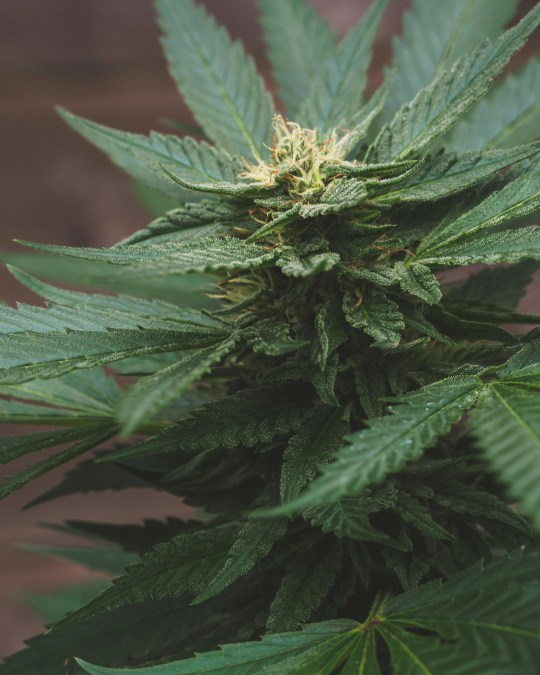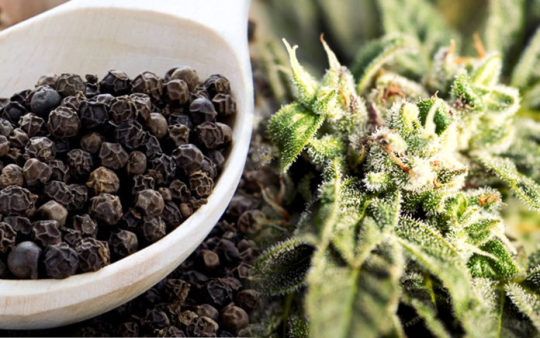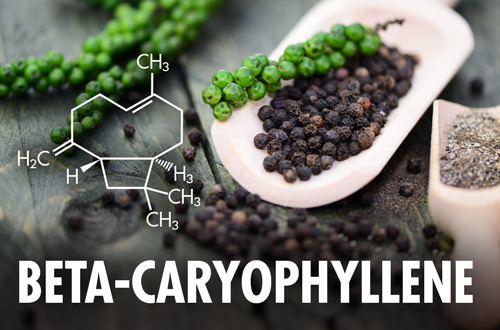One of the standout features of BCP Plus is its in-depth exploration of beta-caryophyllene terpene benefits. This section delves into the scientific studies and anecdotal evidence surrounding beta-caryophyllene, highlighting its potential advantages for health and well-being. From its anti-inflammatory properties to its potential role in pain management, the site provides a thorough overview of how this terpene might positively impact various aspects of human health. Users can access detailed articles, expert opinions, and user testimonials to gain a well-rounded perspective on the benefits of beta-caryophyllene.Check This Website: https://bcp.plus/
Don't wanna be here? Send us removal request.
Text
Beta-Caryophyllene: Nature's Answer to Modern Health
As the wellness industry shifts toward plant-based solutions, beta-caryophyllene is emerging as a front-runner. This natural compound, categorized as a dietary cannabinoid, is carving a niche in therapeutic research and wellness applications. Among its many features, the most studied are the beta-caryophyllene health benefits that address inflammation, pain, and emotional imbalance.
What makes beta-caryophyllene different is its dual identity—it’s both a terpene and a cannabinoid. Most cannabinoids come from cannabis, but BCP is found in several common herbs and spices. When we talk about how does BCP work, its ability to bind selectively with the CB2 receptor allows it to act as a natural anti-inflammatory agent without triggering mind-altering effects.
From joint pain to skin irritation, the beta-caryophyllene terpene benefits encompass a broad range of health concerns. Topical products and oils infused with BCP are gaining popularity in holistic medicine and personal care. These applications leverage the caryophyllene effects to calm inflammatory responses and accelerate tissue repair. It's a standout example of science validating traditional uses of herbal remedies.

Another intriguing facet of caryophyllene terpene effects is the neuroprotective function. Laboratory studies have demonstrated that BCP may help preserve cognitive function by reducing inflammation in neural tissues. This opens exciting discussions about the role of beta-caryophyllene in managing age-related cognitive decline and possibly even neurodegenerative diseases.
Not to be overlooked, BCP benefits also include support for digestive health. In conditions such as Crohn’s disease and irritable bowel syndrome, beta-caryophyllene shows potential in calming intestinal inflammation and improving nutrient absorption. This aligns with growing demand for natural, gut-friendly solutions in modern diets and health regimens.
As we learn more about the body's endocannabinoid system and its role in maintaining balance, the spotlight on beta-caryophyllene grows brighter. Its ability to interact with biological pathways without undesirable side effects gives it an edge in the realm of integrative health. The growing evidence for beta-caryophyllene benefits suggests this compound could revolutionize how we approach daily wellness.
#beta_caryophyllene_benefits#beta_caryophyllene_terpene_benefits#caryophyllene_terpene_effects#how_does_BCP_work
0 notes
Text

BCP: Nature's Anti-Inflammatory Powerhouse
Nature's pharmacy offers a wealth of compounds with potent medicinal properties, and Beta-caryophyllene stands out as a remarkable example of this. Often referred to as BCP, this terpene, abundant in various plants, has garnered significant attention for its powerful anti-inflammatory effects. Inflammation, while a necessary bodily response to injury or infection, can become chronic and contribute to a wide range of diseases. Understanding how β-caryophyllene can help modulate this process is crucial for developing natural strategies to combat inflammation and promote overall health. The intricate molecular structure of BCP allows it to interact with specific receptors in the body, triggering a cascade of anti-inflammatory responses. Further research is focused on identifying the specific isoforms of enzymes and cytokines that are most effectively targeted by Beta-caryophyllene.
The presence of Beta-caryophyllene in common spices like black pepper, cloves, and cinnamon highlights its integral role in traditional medicine and culinary practices. Beyond adding flavor and aroma, these plants have been valued for their medicinal properties for centuries, and BCP is increasingly recognized as a key contributor to these benefits. The ability to extract and isolate bcp has allowed for focused research on its specific mechanisms of action, revealing its unique interaction with the body's endocannabinoid system. This interaction sets it apart from many other anti-inflammatory agents. The development of standardized extracts of Beta-caryophyllene with consistent potency is crucial for ensuring reliable therapeutic outcomes.
At the heart of Beta-caryophyllene's anti-inflammatory prowess lies its ability to bind to the CB2 receptor, a component of the endocannabinoid system. Unlike the CB1 receptor, activation of the CB2 receptor by β-caryophyllene does not produce psychoactive effects. This targeted interaction allows for the therapeutic benefits of cannabinoid receptor activation without the unwanted side effects associated with THC. The activation of CB2 receptors by bcp triggers a cascade of cellular events that ultimately lead to a reduction in inflammation. This activation can influence the migration of immune cells to sites of inflammation and modulate the release of inflammatory mediators.
One of the primary ways Beta-caryophyllene exerts its anti-inflammatory effects is by inhibiting the production of pro-inflammatory cytokines. These signaling molecules play a key role in orchestrating the inflammatory response, and their overproduction can lead to chronic inflammation and tissue damage. Studies have shown that β-caryophyllene can effectively suppress the release of these cytokines, thereby dampening the inflammatory cascade. This mechanism is particularly relevant in conditions like arthritis, where chronic inflammation contributes to joint pain and damage. The specific cytokines targeted by Beta-caryophyllene and the signaling pathways involved are areas of ongoing investigation.
The impact of Beta-caryophyllene on inflammatory pathways extends beyond cytokine modulation. It has also been shown to inhibit the activity of certain enzymes involved in the inflammatory process, such as cyclooxygenase-2 (COX-2). This is similar to the mechanism of action of non-steroidal anti-inflammatory drugs (NSAIDs), but bcp offers a potentially gentler approach with fewer side effects. By targeting multiple aspects of the inflammatory response, Beta-caryophyllene demonstrates a comprehensive approach to managing inflammation. The selectivity of Beta-caryophyllene for certain inflammatory pathways compared to NSAIDs is a key area of interest for researchers seeking safer and more targeted anti-inflammatory therapies.
Research continues to uncover the potential of Beta-caryophyllene in addressing various inflammatory conditions. Studies have shown promising results in animal models of inflammatory bowel disease, suggesting its ability to reduce inflammation in the gut. Furthermore, its neuroprotective properties, partly attributed to its anti-inflammatory effects, make it a potential therapeutic agent for neurodegenerative diseases characterized by neuroinflammation. The ability of β-caryophyllene to cross the blood-brain barrier further enhances its potential in this area. The role of Beta-caryophyllene in modulating the blood-brain barrier itself is also being explored, as inflammation can disrupt this protective barrier.
0 notes
Text

Exploring the Synergy Between Terpenes and Inflammation Care
Terpenes play a crucial role in the medicinal properties of plants, contributing to their therapeutic benefits beyond just aroma and flavor. Among these compounds, β-caryophyllene (BCP) stands out for its ability to provide natural relief from inflammation. By directly engaging with CB2 receptors in the endocannabinoid system, BCP offers a unique, non-psychoactive method for controlling chronic inflammatory responses.
Inflammation is a critical component of many diseases, including autoimmune disorders, chronic pain conditions, and metabolic syndromes. Traditional anti-inflammatory medications, such as nonsteroidal anti-inflammatory drugs (NSAIDs), often come with long-term risks, including gastrointestinal issues and cardiovascular complications. BCP provides an alternative for those exploring what terpenes are good for inflammation, as it offers targeted relief with minimal side effects.
#what terpenes are good for inflammation#BCP inflammation benefits#Terpenes that help with inflammation
0 notes
Text

The Role of β-caryophyllene in Combating Inflammation and Pain
β-caryophyllene, commonly referred to as Beta-caryophyllene or simply bcp, has emerged as a game-changing compound in the field of natural pain relief and inflammation management. Found in plants such as black pepper, basil, and oregano, bcp interacts directly with CB2 receptors in the human endocannabinoid system to produce targeted anti-inflammatory effects.
Research reveals that Beta-caryophyllene can inhibit the production of pro-inflammatory cytokines, thus addressing the root cause of inflammation rather than merely masking the symptoms. This positions β-caryophyllene as an ideal solution for those suffering from chronic inflammatory conditions such as arthritis and inflammatory bowel disease.
Another exciting development is the growing acceptance of Beta-caryophyllene as a natural alternative to opioids. Since bcp does not interact with CB1 receptors, it avoids the psychoactive effects associated with THC. As a result, β-caryophyllene can provide pain relief without impairing mental clarity or leading to dependency.
Beyond inflammation and pain, Beta-caryophyllene shows promise in addressing neuropathic pain, a condition often resistant to conventional treatments. For individuals coping with conditions such as diabetic neuropathy, bcp offers hope as a non-toxic and effective treatment option.
Clinical studies are also investigating the role of β-caryophyllene in reducing oxidative stress. By neutralizing free radicals, Beta-caryophyllene could further mitigate chronic inflammatory conditions, thereby supporting long-term health and wellness.
The journey of bcp from being a simple terpene to a therapeutic powerhouse underscores the ingenuity of nature. As research continues to uncover more about Beta-caryophyllene’s mechanisms, its applications are likely to expand across both medical and wellness industries.
1 note
·
View note